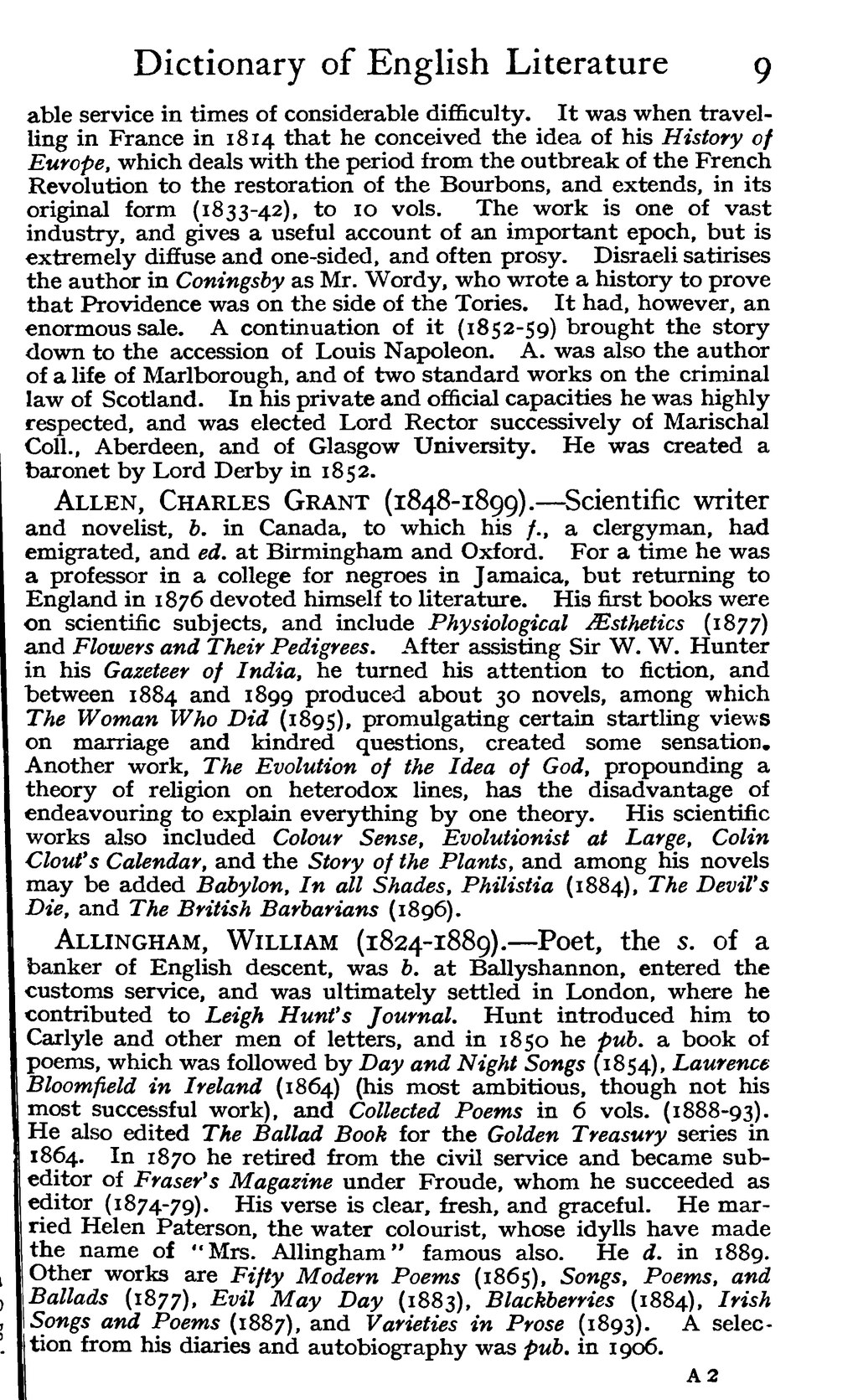able service in times of considerable difficulty. It was when travelling in France in 1814 that he conceived the idea of his History of Europe, which deals with the period from the outbreak of the French Revolution to the restoration of the Bourbons, and extends, in its original form (1833–42), to 10 vols. The work is one of vast industry, and gives a useful account of an important epoch, but is extremely diffuse and one-sided, and often prosy. Disraeli satirises the author in Coningsby as Mr. Wordy, who wrote a history to prove that Providence was on the side of the Tories. It had, however, an enormous sale. A continuation of it (1852–59) brought the story down to the accession of Louis Napoleon. A. was also the author of a life of Marlborough, and of two standard works on the criminal law of Scotland. In his private and official capacities he was highly respected, and was elected Lord Rector successively of Marischal Coll., Aberdeen, and of Glasgow University. He was created a baronet by Lord Derby in 1852.
Allen, Charles Grant (1848–1899).—Scientific writer and novelist, b. in Canada, to which his f., a clergyman, had emigrated, and ed. at Birmingham and Oxford. For a time he was a professor in a college for negroes in Jamaica, but returning to England in 1876 devoted himself to literature. His first books were on scientific subjects, and include Physiological Æsthetics (1877) and Flowers and Their Pedigrees. After assisting Sir W.W. Hunter in his Gazeteer of India, he turned his attention to fiction, and between 1884 and 1899 produced about 30 novels, among which The Woman Who Did (1895), promulgating certain startling views on marriage and kindred questions, created some sensation. Another work, The Evolution of the Idea of God, propounding a theory of religion on heterodox lines, has the disadvantage of endeavouring to explain everything by one theory. His scientific works also included Colour Sense, Evolutionist at Large, Colin Clout's Calendar, and the Story of the Plants, and among his novels may be added Babylon, In all Shades, Philistia (1884), The Devil's Die, and The British Barbarians (1896).
Allingham, William (1824–1889).—Poet, the s. of a banker of English descent, was b. at Ballyshannon, entered the customs service, and was ultimately settled in London, where he contributed to Leigh Hunt's Journal. Hunt introduced him to Carlyle and other men of letters, and in 1850 he pub. a book of poems, which was followed by Day and Night Songs (1854), Laurence Bloomfield in Ireland (1864) (his most ambitious, though not his most successful work), and Collected Poems in 6 vols. (1888–93). He also edited The Ballad Book for the Golden Treasury series in 1864. In 1870 he retired from the civil service and became sub-editor of Fraser's Magazine under Froude, whom he succeeded as editor (1874–79). His verse is clear, fresh, and graceful. He married Helen Paterson, the water colourist, whose idylls have made the name of "Mrs. Allingham" famous also. He d. in 1889. Other works are Fifty Modern Poems (1865), Songs, Poems, and Ballads (1877), Evil May Day (1883), Blackberries (1884), Irish Songs and Poems (1887), and Varieties in Prose (1893). A selection from his diaries and autobiography was pub. in 1906.
